Charles Churchill (satirist) facts for kids
Quick facts for kids
Charles Churchill
|
|
|---|---|
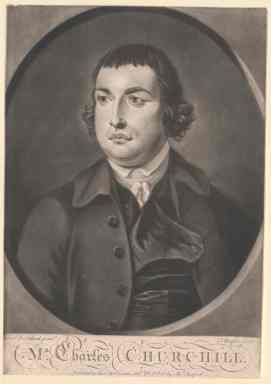 |
|
| Born | February 1732 Vine Street, Westminster, England
|
| Died | 4 November 1764 (aged 32) Boulogne, France
|
| Education | Westminster School |
| Occupation | Anglican clergyman, poet, satirist |
| Spouse(s) | Miss Scott |
| Children | Two sons |
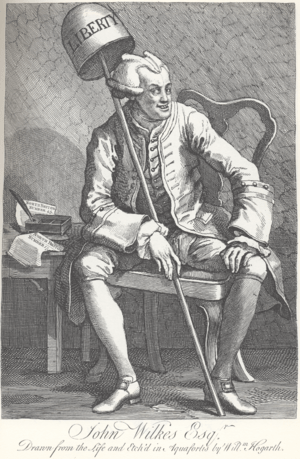
A drawing of John Wilkes by William Hogarth.
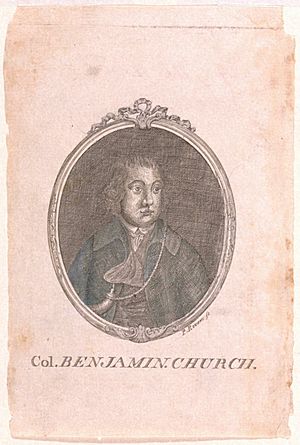
This image of Charles Churchill was used by Paul Revere as a fake portrait of Colonel Benjamin Church.
|
Charles Churchill (born February 1732 – died 4 November 1764) was an English poet and satirist. A satirist is someone who uses humor, irony, or exaggeration to criticize people or ideas. Churchill was known for his sharp and witty poems that often made fun of public figures and society.
Contents
Charles Churchill's Early Life
Charles Churchill was born in Vine Street, Westminster, England. His father, Reverend Charles Churchill, was a church leader. He worked as a rector in Rainham, Essex. Charles went to Westminster School, where he became very good at learning classical languages. There, he also became close friends with Robert Lloyd.
When he was 18, Charles married a woman named Miss Scott. He did not go to St John's College, Cambridge, even though he was accepted. The young couple lived with his father. Later, Charles went to northern England to prepare to become a priest.
He became a curate at the church of St Thomas à Becket in South Cadbury, Somerset. In 1756, he became a priest and started helping his father at Rainham. Two years later, his father passed away. Charles was chosen to take over his father's church roles. He earned less than £100 a year. To make more money, he taught at a girls' school.
His marriage was not happy. He spent a lot of time with his friend Robert Lloyd. In 1761, he separated from his wife. He faced serious debt, but Robert Lloyd's father, Pierson Lloyd, helped him out. Pierson Lloyd was a teacher at Westminster School.
Becoming a Famous Satirist
Churchill had already written some things for publishers. His friend Robert Lloyd had also found success with a poem called The Actor. Churchill used his knowledge of the theater to write Rosciad, which came out in March 1761.
This poem was a funny but bold satire. It described the flaws of different actors and actresses on the London stage. In the poem, David Garrick was named the greatest English actor. The poem became popular very quickly. This was partly because it talked about real people. But its strong and lively writing still makes it interesting today.
At first, The Rosciad was published without an author's name. A magazine called the Critical Review thought it was written by a group of people. Churchill quickly published another poem called Apology addressed to the Critical Reviewers. In this poem, he strongly attacked the theater again. He also showed great admiration for John Dryden, another famous poet.
In The Rosciad, Churchill had praised some actresses like Mrs Pritchard and Mrs Cibber. But most leading London actors, except for David Garrick, were criticized. In his Apology, Churchill even seemed to threaten Garrick. Garrick tried to avoid criticism by being very polite to Churchill. Churchill became a person that actors feared.
Churchill's satire made him many enemies. It also led to people criticizing him. In his poem Night, an Epistle to Robert Lloyd (1761), he responded to these attacks. He argued that it was better to have faults than to be a hypocrite. His behavior caused the dean of Westminster to criticize him. In 1763, people in his church complained. This led him to give up his church positions. Now, he was free to wear his fancy blue coat without anyone from the church complaining.
Several publishers had refused to print The Rosciad. So, Churchill paid to publish it himself. He earned a lot of money from its sales. He paid back all his old debts and also gave money to his wife.
Friendship with John Wilkes
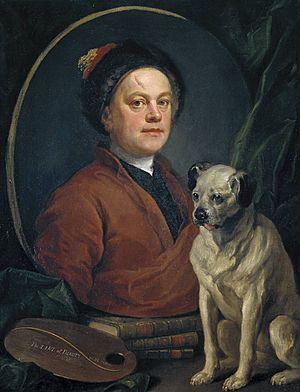
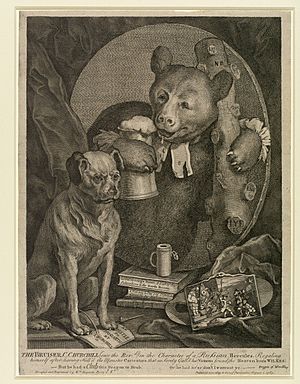
Around 1761 or 1762, Churchill became a close friend of John Wilkes. Wilkes was a strong supporter of freedom of the press. Churchill often helped Wilkes with his weekly newspaper, The North Briton. Working with Wilkes helped Churchill earn an important place in the history of democracy and civil liberties. Civil liberties are basic rights and freedoms that people have.
Churchill's next poem was The Prophecy of Famine: A Scots Pastoral (1763). This poem was based on an article written for The North Briton. It was a strong satire against Scottish influence in politics. This poem fit with the general dislike of Lord Bute, who was Scottish. Scottish people looking for jobs in government were as worried as the actors had been earlier.
When Wilkes was arrested, he warned Churchill to go to the countryside for a while. This was because the publisher had said Churchill received some money from the newspaper. Churchill's Epistle to William Hogarth (1763) was a response to a drawing Hogarth made of Wilkes during his trial. In this poem, Churchill attacked Hogarth's pride and jealousy.
The Duellist (1763) was a harsh satire. It targeted Wilkes's main opponents in the House of Lords, especially Bishop Warburton. In The Ghost, Churchill also criticized Dr Johnson. He called him "Pomposo, insolent and loud."
Other poems by Churchill include:
- The Conference (1763)
- The Author (1763), which was highly praised by people at the time.
- Gotham (1764), a poem about what a king should do. It was more about teaching than making fun.
- The Candidate (1764), a satire about John Montagu, the fourth Earl of Sandwich. Sandwich was one of Wilkes's biggest enemies.
- The Farewell (1764)
- The Times (1764)
- Independence
- An unfinished poem called Journey.
Later Life and Legacy
In October 1764, Charles Churchill traveled to Boulogne, France, to meet John Wilkes. There, he became sick with a fever and passed away on 4 November 1764.
He left his property to his two sons. He also made John Wilkes the person in charge of his writings. Wilkes did not do much with them. He wrote a short message for Churchill's grave and a few notes on his poems.
Churchill was known for being generous to his friends. In 1763, he found his friend Robert Lloyd in prison because of debt. Churchill paid money each week to help Lloyd live better in prison. He also helped raise money to set Lloyd free. When Lloyd heard about Churchill's death, he became ill and died soon after. Churchill's sister, Patty, who was engaged to Lloyd, also passed away not long after them. William Cowper, another famous poet, went to school with Churchill. Cowper wrote many kind things about him.
A collection of some of Churchill's poems was published in 1763.
Images for kids


